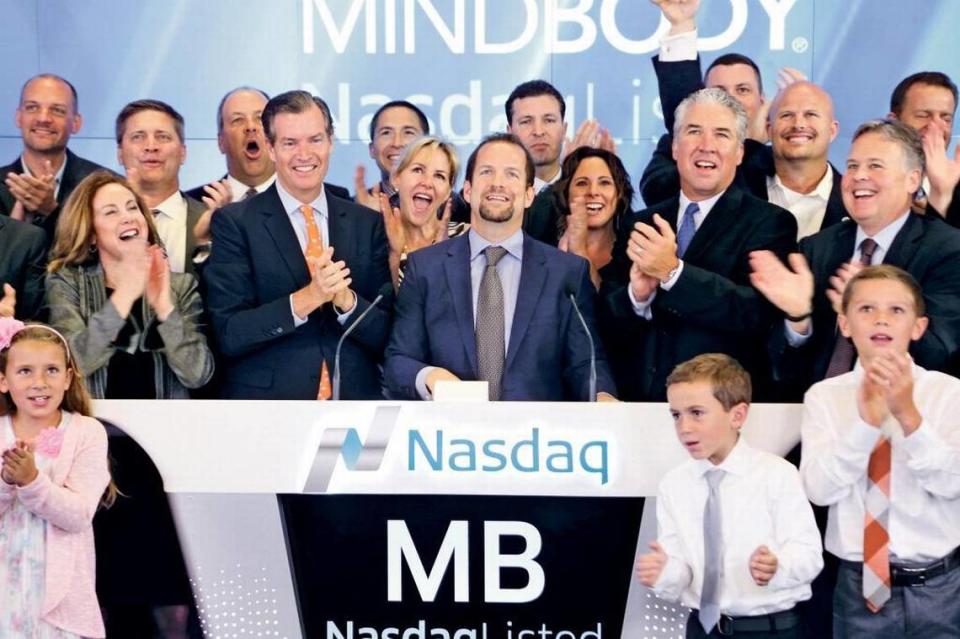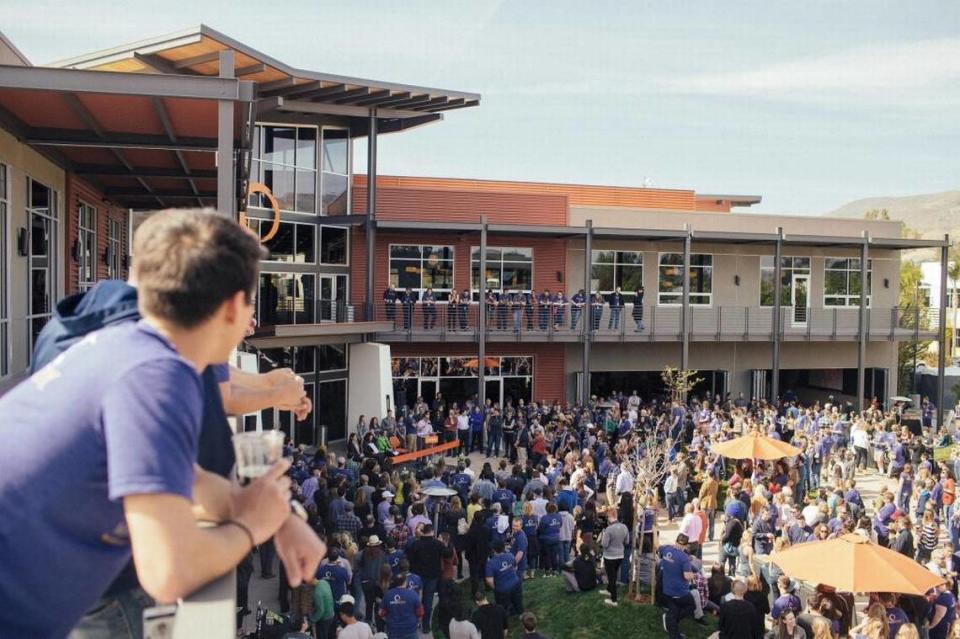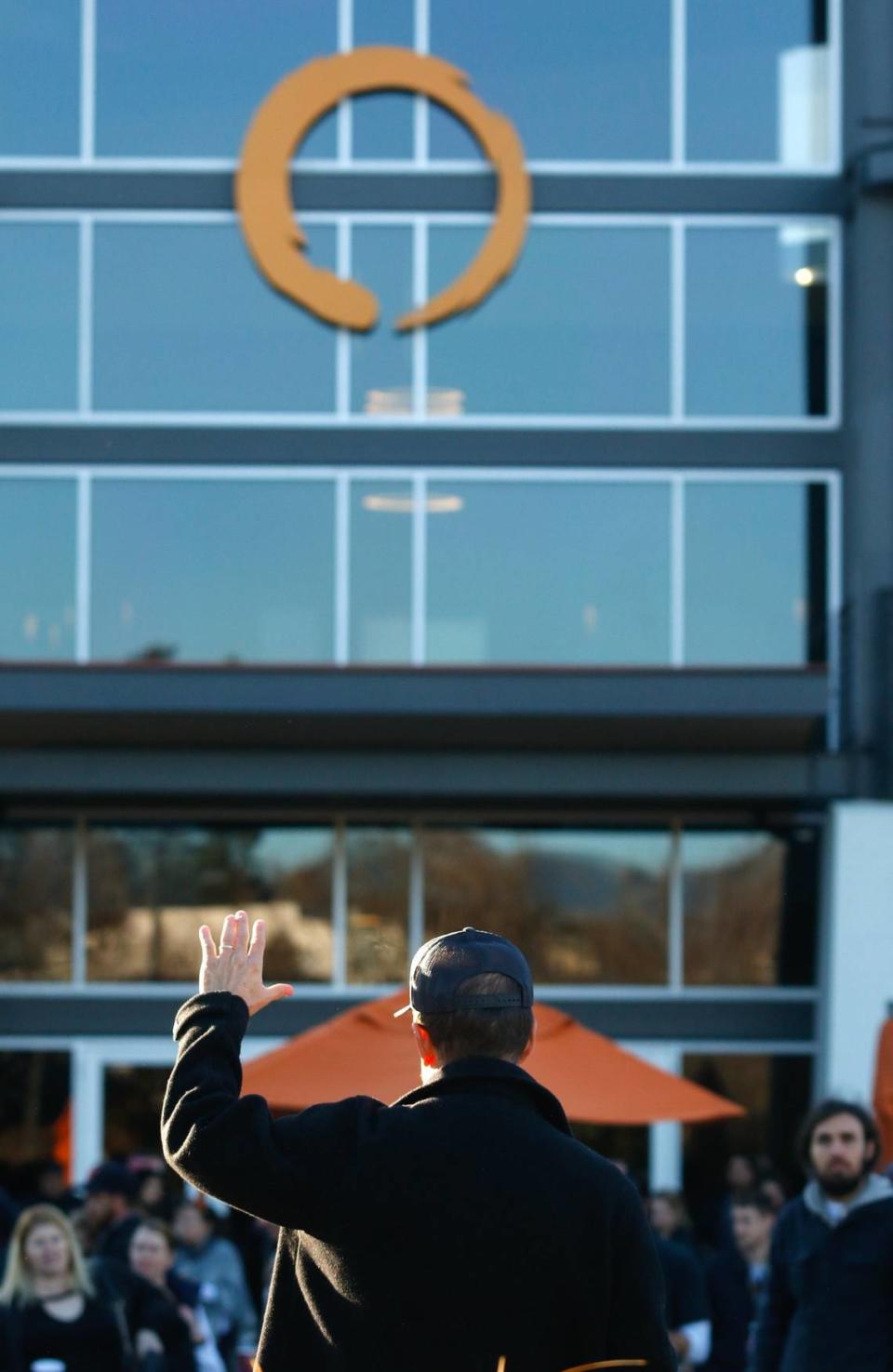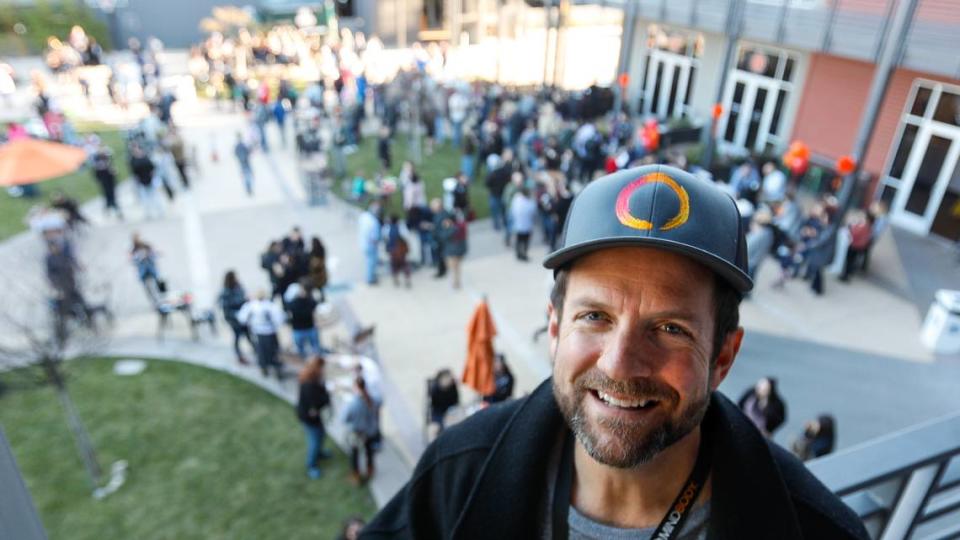Ex-Mindbody CEO ‘greased the wheels’ for sale, judge says, ordering $48 million in penalties
The $1.9 billion takeover of one of San Luis Obispo’s most prominent tech companies was tainted from the get-go, a Delaware judge has ruled, blasting its former CEO and the buyer and ordering them to pay at least $48 million in penalties.
In a post-trial opinion released March 15, Delaware Court of Chancery Chancellor Kathaleen McCormick said former Mindbody CEO Rick Stollmeyer “greased the wheels” for Vista Equity Partners’ speedy buyout of the tech company in 2019, and unfairly influenced the buying process in its favor.
“Rather than slowing Vista down, Stollmeyer helped Vista get ahead,” McCormick wrote in the 120-page opinion.
Though the opinion was publicly released last month, it was originally submitted in July 2022 at the conclusion of a trial stemming from a lawsuit brought by Luxor Capital Partners LP — which owned the second-largest block of Mindbody stock.
Luxor filed the lawsuit on behalf of a class of Mindbody stockholders, case documents show, claiming Stollmeyer breached his fiduciary obligations during the merger, and that “Vista aided and abetted those breaches.”
Ultimately, McCormick ruled that both Vista and Stollmeyer failed to disclose facts about the sale process — including the former Mindbody CEO’s interactions with Vista leading up to the merger — and that Stollmeyer unfairly “tilted the process” in the private equity firm’s favor.
“(Stollmeyer) did not strive in good faith to pursue the best transaction reasonably available,” the opinion read. “He instead pursued a fast sale to Vista to further his personal interests.”
The judge ruled Stollmeyer and Vista Equity would be liable for damages of $1 per share, plus interest.
According to the case findings, at the time of the merger discussions, Mindbody had more than 48 million outstanding shares. It is unclear how that $48 million in penalties might be divvied up.
In a statement sent to The Tribune via his counsel, Stollmeyer said he was “disappointed” in the ruling.
“I disagree and am disappointed with the court’s opinion,” he said. “However, as the litigation is still ongoing and we are exploring all options, I have no further comment at this time.”
When reached by email Tuesday, a Mindbody representative declined to comment on the litigation. Tribune requests for comment from Vista and its legal representatives were not returned as of Tuesday.

Vista Equity acquires San Luis Obispo tech company
Many were stunned when one of San Luis Obispo County’s most well-known tech companies announced on Christmas Eve 2018 that it was suddenly in the process of being purchased by a San Francisco-based private equity firm.
On Dec. 24, 2018, Mindbody officials announced Vista Equity had entered into an agreement to acquire all outstanding shares of the health and wellness software company’s stock at a price of $36.50 per share.
That was a 68% premium on Mindbody’s most-recent closing share price of $21.72 at that time, according to previous Tribune reports.
It was a move that would also take the company, which had gone public in 2015, back to private ownership, and would set it up for future growth, officials said.
“We are thrilled to provide immediate liquidity to our shareholders at a significant premium to market prices and to leverage Vista’s resources and deep expertise to accelerate our growth while achieving that purpose more effectively than ever before,” Stollmeyer said in a news release at the time.
The deal would also come with substantial payouts for Mindbody’s top executives.
In the company’s January 2019 filing to the federal Securities and Exchange Commission, a merger report for shareholders showed Stollmeyer would receive more than $61 million from sales of his shares of Mindbody stock and an annual equity award grant once the deal was finalized, according to previous Tribune reporting.
Other Mindbody executives also stood to make millions from the deal, which was finalized in February 2019.
“We look forward to partnering with Rick and the entire Mindbody team to deliver innovation to customers that will help grow their businesses and to consumers who depend on Mindbody to strengthen their health and well-being,” Brian Sheth, Vista’s president and co-founder, said in a statement at the time of the merger.

Former Mindbody CEO zeroed in on private equity firm, judge says
According to the ruling, Stollmeyer began shopping around for a buyer for Mindbody starting in 2018 — during a rough period for the company following the acquisition of other tech outfits that left it operating at a significant net loss, as well as with some internal troubles.
Stollmeyer himself seemed to be facing some financial burdens at the time, including pledging “$3 million to a local college, of which $2.4 million was unpaid,” the ruling said. During the trial, Stollmeyer denied that he needed liquidity in early 2018.
He did face a looming 2021 deadline on which his shares of super-voting stock in Mindbody would automatically convert to common stock, according to the ruling. That would drop his voting power from 19.8% — the second largest block of votes — to less than 4%.
Stollmeyer was also aware that Mindbody’s largest stockholder, Institutional Venture Partners (IVP), was also looking for an opportunity to sell in the near future, according to the ruling.
“Stollmeyer had grown frustrated with his inability to monetize his holdings of Mindbody stock, fearful of the volatility and fickleness of the public markets and uncertain about his ability to lead Mindbody through its next stage of its growth,” McCormick wrote in her ruling. “A sale of the company would solve his problems, and Stollmeyer decided it was a good time to sell.”
In August 2018, Stollmeyer met with a banker who introduced him to Vista, which in turn invited him to attend a summit for CEOs of formerly public companies that had been acquired by Vista, according to the ruling.
In that initial meeting with Vista, Stollmeyer also disclosed he planned to step down from the company in the next two to three years — something he did not share with other potential buyers at the time, according to the ruling. He also did not tell the board he had disclosed that information.
“After the Vista conference, Stollmeyer’s focus seemed to shift,” McCormick wrote in her ruling. “He no longer was interested in just any sale of the company. He wanted to sell to Vista.”

Vista Equity sprints to fast acquisition
Things quickly progressed from there.
According to the ruling, Stollmeyer was warned that Vista liked to push sales through fast — a method internally called “Sprinting” that aimed to shorten the approval process and prevent other competition from jumping in with more attractive offers.
In a text message shown as evidence during the trial, soon after the conference, Vista Senior Vice President Nicholas Stahl joked to Vista principal Monti Saroya about getting higher-up approval “to get a hunting license” — in other words, to start pursuing the company — after Mindbody’s stock dropped 6%.
Internally, Vista representatives were pushing to have a deal signed by November, court documents show.
Meanwhile a “Vista-smitten” Stollmeyer was already all in, McCormick wrote, setting things up behind the scenes for a speedy acquisition.
In the week following Vista submitting its expression of interest in buying the company, Stollmeyer told his management team to let him “socialize” the topic of a buyout with the board of directors, met with IVP and checked Vista’s references, according to the ruling.
“Meanwhile, Vista accelerated to deal velocity, contracted for a detailed market study and put itself in a position to make a firm offer long before other bidders could react,” McCormick wrote.
The Mindbody board of directors wasn’t alerted to Vista’s expression of interest until the next week, and didn’t form a transaction committee to consider running a sale process until two weeks after that, according to the ruling.
An IVP representative was chosen as the de facto chair of the transaction committee, documents show.
Four of Mindbody’s six outside directors testified during the trial, saying they were “unaware of key facts” at that time, such as the extent of Stollmeyer’s interactions with Vista and that IVP was looking to exit the company and might be biased in favor of a fast sale.
Stollmeyer then tipped Vista off that a formal sale process was beginning — in violation of the committee’s communication rules — and the banker who had introduced him and Vista alerted the private equity firm to Stollmeyer’s target sale price of $40 per share, according to the findings.
“By the time the committee had authorized its banker to contact financial bidders, Vista was poised to pounce,” the ruling read.
On Dec. 18, 2018, only three days after privileged company data had been made available to seven potential buyers, Vista submitted an offer to acquire the company for $35 per share.
Vista had made a firm offer while other interested parties were “still in the early stages of their work and could not respond within that timeframe,” McCormick wrote.
When reached out to during this time, one of the only remaining companies still considering a bid said it would take two more weeks for them to draft a full proposal and there was “no path to $40 per share,” according to the ruling.
Vista then bumped the bid up to $36.50, getting mixed reactions from directors, but on Dec. 21, 2018, the board directed management to accept the bid and negotiate a merger agreement.
According to evidence presented at the trial, in a text to his financial adviser after the buyout was announced, Stollmeyer wrote, “Vista’s in love with me (and me with them). No retirement in my headlights.”

Merger deal closes
After the deal was signed, a 30-day go-shop period opened up during which other interested parties could submit their own proposals to compete with Vista.
About halfway through that period, Stollmeyer went on vacation to Costa Rica and directed management to decline go-shop presentations in his absence unless they were urgent, according to the ruling.
“Stollmeyer was signaling his lack of interest in a competing offer,” McCormick wrote.
The company’s hired financial analyst reached out to 52 potential bidders — 38 of which were entities that were not part of the original sale process — but only eight received the management presentation and signed a non-disclosure agreement to gain access to important data, according to the case findings.
Only two businesses expressed an interest in continuing due diligence after that.
There were also rumors that Luxor was attempting to put together its own competing bid, but ultimately that did not pan out, according to the ruling.
A proxy statement on the deal filed with the SEC in late January 2019 omitted references to Stollmeyer’s initial contact with Vista ahead of the Nov. 30, 2018, opening of the sale process, while internally at Vista, a representative was reminded to “stick to the story” that the company was invited to participate in November, and not earlier, according to the ruling.
Around the same time, and ahead of a shareholder vote on the merger in February, Mindbody was debating whether to release its preliminary fourth quarter 2018 financial results that showed the company had beat projections and brought in $68.3 million in revenue in the final part of the year, documents show.
Though the company was still technically public, it did not necessarily have to release these results because they were not the official quarterly numbers.
Some pushed for the preliminary findings to be released ahead of the vote so shareholders could make an informed decision, while others expressed concern about whether the information could impact the merger.
Ultimately the company did not disclose the financial results.
Stockholders approved the merger during a special meeting on Feb. 14, 2019, and the deal closed the next day.

Stollmeyer, Vista say breach of duties claim ‘makes no sense’
Stollmeyer stayed on with Mindbody for almost a year after the merger, but in July 2020, it was announced he would be transitioning away from his role as CEO and would instead move to executive chair of the Mindbody board of directors.
According to his LinkedIn profile, Stollmeyer appears to have quietly ended his term with the board in October 2021. The company made no announcement of the change. He currently is listed as the CEO of Inspired Flight Technologies Inc. in San Luis Obispo.
In a post-trial brief filed June 10, 2022, Stollmeyer and Vista responded to the claims of Vista being given unfair advantages ahead of the merger, saying that it was all part of a narrative advanced by Luxor.
“In the end, this case is really about a hedge fund that made tens of millions of dollars on its Mindbody investment seeking to extract more,” the brief read. “Luxor has demonstrated that it will leave no prisoners in its quest for a greater return, including potentially ruining the livelihood and reputation of the CEO whose vision, hard work and leadership helped Luxor realize its already substantial returns.”
The brief asserted that Stollmeyer’s previous engagement with Vista representatives ahead of an official sale process was “not problematic” because he was not using it to advance his own interests ahead of other shareholders.
“In truth, Stollmeyer believed that by engaging with Vista, he was developing credibility, which Stollmeyer believed would help attain the highest price possible from Vista,” the brief read.
“A finding that Stollmeyer breached his fiduciary duties makes no sense,” it continued. “Ultimately, Vista offered more than any other buyer.”

